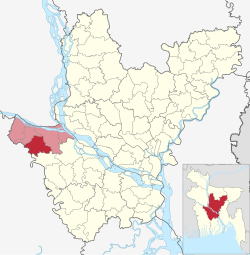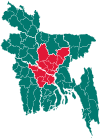Baliakandi Upazila
Baliakandi
বালিয়াকান্দি | |
|---|---|
 | |
| Coordinates: 23°38.1′N 89°33′E / 23.6350°N 89.550°E | |
| Country | |
| Division | Dhaka |
| District | Rajbari |
| Area | |
• Total | 228.99 km2 (88.41 sq mi) |
| Population | |
• Total | 230,031 |
| • Density | 1,000/km2 (2,600/sq mi) |
| Time zone | UTC+6 (BST) |
| Postal code | 7730[2] |
| Website | www |
Baliakandi (Bengali: বালিয়াকান্দি) is an Upazila of Rajbari District in the Division of Dhaka, Bangladesh.[3]
History
[edit]Baliakandi Thana was established in 1881. This Thana was converted into an upazila in 1983. The area of the upazila town is 6.20 square kilometers. The upazila town is made up of three mouzas. The words 'Bali' of Baliari (sand dune) and 'Kanda' (river bank) of Chandana River are believed to have played a role in the naming of Baliakandi, which is built in Baliari of Chandana River.[4]
Geography
[edit]The total area of Baliakandi Upazila is 228.99 square kilometers with land area of 203 square kilometers. It shares borders with Kalukhali Upazila to the north. Madhukhali Upazila of Faridpur District to the south, Rajbari Sadar Upazila to the east. A portion of Kalukhali Upazila and Sreepur Upazila of Magura District are on the west. The upazila is located at latitude 23°33 and 23°44 north and longitudes 90°26 and 90°40 south. Then central Baliakandi Upazila is located at 23°38′07″N 89°32′58″E / 23.6352°N 89.5495°E.[5]
Demographics
[edit]| Year | Pop. (000) | ±% |
|---|---|---|
| 1981 | 137 | — |
| 1991 | 163 | +19.0% |
| 2001 | 187 | +14.7% |
| 2011 | 207 | +10.7% |
| 2022 | 230 | +11.1% |
| Source: Bangladesh Bureau of Statistics[5] | ||
As of the 2011 Census of Bangladesh, Baliakandi upazila had 46,262 households and a population of 207,086. 44,652 (21.56%) were under 10 years of age. Baliakandi had an average literacy rate of 55.5%, compared to the national average of 51.8%, and a sex ratio of 997 females per 1000 males. 9,897 (4.78%) of the population lived in urban areas.[7][8]
Administration
[edit]Baliakandi Upazila is divided into seven union parishads: Baharpur, Baliakandi, Islampur, Jamalpur, Jangal, Narua, and Nawabpur. The union parishads are subdivided into 149 mauzas and 258 villages.[5]
See also
[edit]References
[edit]- ^ National Report (PDF). Population and Housing Census 2022. Vol. 1. Dhaka: Bangladesh Bureau of Statistics. November 2023. p. 399. ISBN 978-9844752016.
- ^ "Bangladesh Postal Code". Dhaka: Bangladesh Postal Department under the Department of Posts and Telecommunications of the Ministry of Posts, Telecommunications and Information Technology of the People's Republic of Bangladesh. 21 October 2024.
- ^ Tipu, Badrul Alam (2012). "Baliakandi Upazila". In Islam, Sirajul; Jamal, Ahmed A. (eds.). Banglapedia: National Encyclopedia of Bangladesh (Second ed.). Asiatic Society of Bangladesh.
- ^ Khan, Shamsuzzaman. বাংলা একাডেমি বাংলাদেশের লোকজ সংস্কৃতি গ্রন্থমালা - রাজবাড়ী [Bangla Academy Bangladesh Folk Culture Bibliography - Rajbari] (in Bengali). Dhaka: Bangla Academy. ISBN 984-07-5313-4.
- ^ a b c "District Statistics 2011: Rajbari" (PDF). Bangladesh Bureau of Statistics. Archived from the original (PDF) on 13 November 2014. Retrieved 14 July 2014.
- ^ Population and Housing Census 2022 - District Report: Rajbari (PDF). District Series. Dhaka: Bangladesh Bureau of Statistics. June 2024. ISBN 978-984-475-243-6.
- ^ "Bangladesh Population and Housing Census 2011 Zila Report – Rajbari" (PDF). bbs.gov.bd. Bangladesh Bureau of Statistics.
- ^ "Community Tables: Rajbari district" (PDF). bbs.gov.bd. Bangladesh Bureau of Statistics. 2011.

